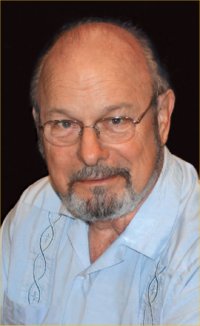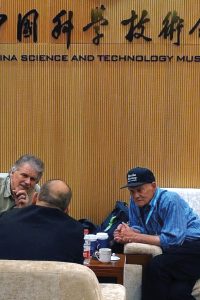Joe Haldeman: Art & Science
 Joe William Haldeman was born June 9, 1943 in Oklahoma City OK. He married Mary Gay Potter in 1965, and earned a BS in physics and astronomy from the University of Maryland in 1967. From 1967-69, he served as a combat engineer in the US Army in Vietnam, where he was seriously wounded and won a Purple Heart. He returned to college, attending graduate school at the University of Iowa from 1969-70, and got his MFA in 1975. He has been mostly a freelance writer since 1970, though since 1983 he has also taught writing classes at MIT.
Joe William Haldeman was born June 9, 1943 in Oklahoma City OK. He married Mary Gay Potter in 1965, and earned a BS in physics and astronomy from the University of Maryland in 1967. From 1967-69, he served as a combat engineer in the US Army in Vietnam, where he was seriously wounded and won a Purple Heart. He returned to college, attending graduate school at the University of Iowa from 1969-70, and got his MFA in 1975. He has been mostly a freelance writer since 1970, though since 1983 he has also taught writing classes at MIT.
Haldeman’s first SF story was ‘‘Out of Phase’’ in Galaxy (1969), while his story ‘‘Hero’’ (Analog, 1972) was one of the first in the genre inspired by the Vietnam War, and was a Hugo Award finalist. Novella ‘‘The Hemingway Hoax’’ (1990) won both the Hugo and the Nebula Award; a novel-length version appeared that same year. Other notable stories include Hugo winners ‘‘Tricentennial’’ (1970) and ‘‘None So Blind’’ (1994), Nebula Award finalist ‘‘More than the Sum of His Parts’’ (1985), World Fantasy Award Winner ‘‘Graves’’ (1992), and Hugo finalist ‘‘Four Short Novels’’ (2003).
Haldeman’s first published book was the autobiographical War Year (1972), about Vietnam. His debut SF novel, now-classic The Forever War (1975), won Hugo, Locus, and Nebula Awards. A thematic sequel, Forever Peace (1997), also won Hugo and Nebula Awards, and was followed by an actual sequel, Forever Free (1999). His other SF novels include All My Sins Remembered (1977), Mindbridge (1977), the Worlds trilogy (Worlds, 1981; Worlds Apart, 1985; and Worlds Enough and Time, 1992), There Is No Darkness (1983, with his brother Jack C. Haldeman III), Tool of the Trade (1987), Buying Time (1989; in the UK as The Long Habit of Living), The Coming (2000), Guardian (2002), Tiptree and Nebula Award winner Camouflage (2004), Old Twentieth (2005), and The Accidental Time Machine (2007). His most recent work is the Marsbound trilogy: Marsbound (2008), Starbound (2010), and Earthbound (2011).
His short fiction has been collected in Infinite Dreams (1978), Dealing in Futures (1985), Vietnam and Other Alien Worlds (1993), None So Blind (1995), and A Separate War and Other Stories (2006).
Haldeman has also written mainstream novel 1968 (1994), a pair of Star Trek novels, and two novels in the ’70s under house name Robert Graham. An accomplished poet, Haldeman has won three Rhysling Awards for best SF poetry, and his poems often appear in his story collections. Saul’s Death & Other Poems (1997) was exclusively poetry. He has also edited anthologies, including Cosmic Laughter (1974), Nebula Award Stories Seventeen (1983), Body Armor: 2000 (1986, with Martin H. Greenberg & Charles G. Waugh), Space-Fighters (1988, with Greenberg & Waugh), and Future Weapons of War (2007, with Greenberg). Haldeman also paints watercolors and writes songs.
In 2010, Haldeman was named a SF Grand Master by SFWA. He has also received a Heinlein Award for life achievement (2009). He lives part of the year in Gainesville FL and part in Cambridge MA.
Excerpts from the interview:
‘‘Since the late ’60s and ’70s, science fiction has undergone almost total liberation. Of course, you have a negative-feedback thing where you don’t dare be too conservative about sexual matters. I’m very lucky, because my own zeitgeist was aligned in the right direction for this slow revolution. It was slow in science fiction. It wasn’t a sudden, ‘Oh my God, Philip José Farmer, and now we are all free to write anything we want!’ When Farmer published ‘The Lovers’, everybody said, ‘Phil, are you out of your mind?’ Phil Farmer sort of made a career of thumbing his nose at everybody’s sexual fears.
‘‘Most of Heinlein’s novels, all the way up to Stranger in a Strange Land, could be published as YA now, or sent back with the request, ‘Could you spice things up a little?’ And as for current YA…. If you are a regular publisher, not a science fiction publisher, I think you could come up with a list of things that used to spell ‘young-adult novel.’ I’ve looked at young-adult novels now, and they’re about anal rape, counterfeiting, doing hard time for murder, things like that. It really isn’t like putting on a frock and going to the dance anymore.
‘‘Looking at science fiction in the years from 1950 to 1965, the change was gradual. By the time we changed, mainstream literature was already there. The readership has changed, perhaps even more than the writers have. Even at the height of the pulp magazine era, there was good artistic science fiction being written. I haven’t read Stapledon’s Last and First Men in about 30 years, but I remember thinking it was quite advanced in that regard. But there was no real financial reward for it at the time.”
…
 ‘‘With Earthbound, I completed the Marsbound trilogy. The whole thing started out with a request to do a young-adult novella. The editor didn’t want my first idea, about a girl growing up on Mars. So what was I going to do with that? I went back and made her three or four years older, and I changed the plot to a love story, now that she was old enough to be romantically interested in the pilot of this spaceship bound to Mars.
‘‘With Earthbound, I completed the Marsbound trilogy. The whole thing started out with a request to do a young-adult novella. The editor didn’t want my first idea, about a girl growing up on Mars. So what was I going to do with that? I went back and made her three or four years older, and I changed the plot to a love story, now that she was old enough to be romantically interested in the pilot of this spaceship bound to Mars.
‘‘I was writing the last chapter of Marsbound on the train headed up to Maine, and I was within ten pages of the end when I realized it needed a sequel. So I went up to Maine for my ten-day writing retreat, finished the novel, and started making notes for the sequel. But when I wrote up the proposal for the sequel, Starbound, I realized it had to be two more books. So I pitched it as a trilogy (publishers love trilogies). But I started out to do a young-adult novella.”
…
 ‘‘One of the big problems of science fiction is, ‘How did you get there from here?’ As close as ten, 15 years in the future, you don’t automatically have things changing without progress in some direction. Even if the ‘progress’ is catastrophic, there has to be an intervening past. You do have to think about that, if you’re the right kind of science fiction writer. In my SF from the past decades, when I tried for realism it was like a kind of controlled cynicism – about politics and religion and things like that. This century is pretty much the way I predicted it, in terms of negative aspects. None of what are now current events have proven me wrong.”
‘‘One of the big problems of science fiction is, ‘How did you get there from here?’ As close as ten, 15 years in the future, you don’t automatically have things changing without progress in some direction. Even if the ‘progress’ is catastrophic, there has to be an intervening past. You do have to think about that, if you’re the right kind of science fiction writer. In my SF from the past decades, when I tried for realism it was like a kind of controlled cynicism – about politics and religion and things like that. This century is pretty much the way I predicted it, in terms of negative aspects. None of what are now current events have proven me wrong.”
…
‘‘I am writing a new novel that’s not directly associated with anything I’ve done before. The protagonist is basically a guy who’s a lot like me, and I don’t have to think very hard about what he does: ‘What would I do? OK, I’ll type that down.’ He’s a writer (I’ve never written about a writer for any length) who is also a disabled veteran. I thought, ‘Well, why not? I’ll just go ahead and not be too cautious in that regard.’ And he lives in Iowa City, as we did. It’s a layered novel that’s horror, science fiction, and mainstream.’’






Pingback:SF Tidbits for 2/14/12 - SF Signal – A Speculative Fiction Blog